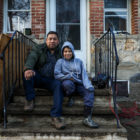Veterans' Health
Up To 10,000 CT Veterans Could Be Eligible For VA Benefits From Burn Pit Exposure
|
Up to 10,000 Connecticut veterans who haven’t been eligible for Veterans Affairs (VA) benefits will now qualify for them if they have medical conditions resulting from exposure to burn pits or toxic contaminants, U. S. VA Secretary Denis McDonough said Wednesday. He was speaking at a news conference after meeting with staff, veterans and their caregivers at VA Connecticut Healthcare in West Haven. The added eligibility is the result of a new federal law, called the PACT Act, which provides an easier path to compensation and care for illnesses that occur after exposure to burn pits and other environmental toxins. It expands the number of veterans eligible nationally for such help by about 300,000, according to the VA. There are now about 56,000 Connecticut veterans enrolled at the VA, according to Pamela Redmond, spokesperson. On Nov.






